How Time Acts As a Project Resource: Why It's Impossible to Ignore
Discover how time impacts project success and learn practical strategies for effective time management to keep your projects on track.
Missed deadlines cost businesses $1.6 trillion globally each year – time is the resource you can’t afford to ignore. In project management, how time acts as a project resource is often underestimated. While budget and personnel are frequently prioritized, time is just as critical, if not more so. Unlike other resources that can be replenished, once time is lost, it's gone forever. This makes managing time effectively a key factor in project success.
Time influences every phase of a project, from planning to execution to final delivery. When managed properly, it drives efficiency, helps meet deadlines, and controls costs. But mismanage it, and delays, budget overruns, and stakeholder dissatisfaction can follow.
In this blog, we’ll explore how time acts as a project resource, its impact on key project elements, strategies for leveraging time effectively, and why time must never be overlooked.
Understanding Time as a Project Resource
Time is more than just a ticking clock in project management—it’s a finite, non-renewable resource that shapes every aspect of a project’s success. Within the triple constraint of project management (scope, time, cost), time acts as the backbone, dictating what can be achieved, when, and at what cost.

Unlike budget or personnel, which can sometimes be adjusted, time is inflexible; once a deadline passes, it’s gone forever. This makes understanding time’s role essential for any project manager aiming to deliver on schedule and within scope.
Why Time Stands Out
- Finite Nature: Time cannot be replenished. A missed deadline in a software development project, for example, can delay a product launch, costing market opportunities.
- Universal Impact: Time affects all project phases, planning, execution, and delivery across industries, from construction to marketing campaigns.
- Driver of Decisions: Time influences task prioritization, resource allocation, and risk management. For instance, a six-month timeline for a building project forces teams to focus on critical tasks like foundation work before aesthetic finishes.
Key Takeaway: Recognizing time as a limited and universal project resource is the first step to mastering it. Effective time management starts with understanding its constraints and planning accordingly to avoid costly delays or compromises.
How Time Impacts Key Project Elements
Time is a powerful force in project management, influencing every key element of a project. From planning to execution, the way time is handled can determine whether a project succeeds or faces setbacks. Here's how time impacts some of the most critical aspects of a project:
1. Project Scheduling
Time is the foundation of your project scheduling. Effective scheduling ensures tasks are completed on time, tracks dependencies, and maintains organization. The earlier you plan, the easier it is to meet deadlines and adjust when needed.
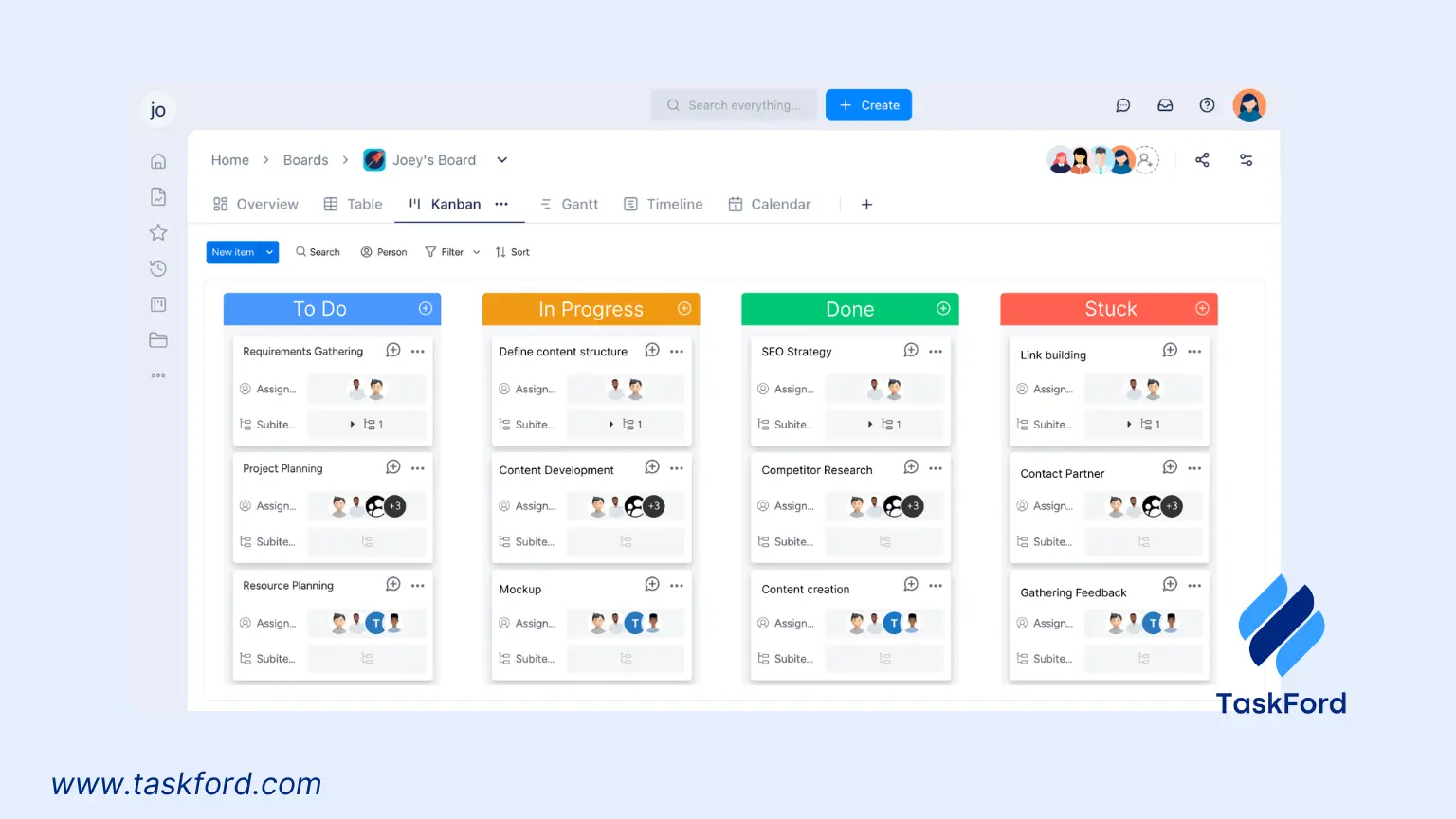
2. Resource Allocation
Time affects resource allocation —whether human, financial, or material. The project timeline dictates when resources are needed, and managing time effectively ensures that resources are neither over- nor underutilized.
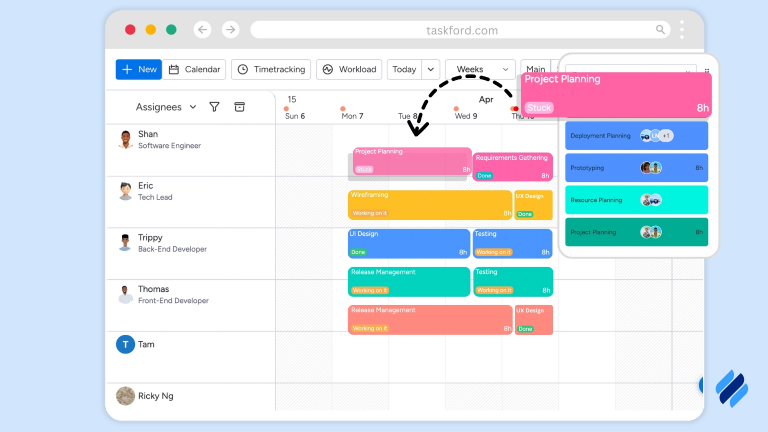
3. Risk Management
Every project has risks, and time helps manage them. Adding buffer time to tasks or phases allows flexibility for unexpected delays, such as technical issues or material shortages, without derailing the project.

4. Budget Control
Time directly impacts the project budget. Delays or poor time management can lead to extra costs like overtime or additional resources. Sticking to the timeline helps control costs and prevent unexpected expenses, making efficient time management strategies to avoid budget overruns.
5. Team Productivity
The way time is managed impacts your team's workflow. Properly set timelines and clear deadlines help teams stay focused and motivated, while excessive pressure or unclear schedules can lead to burnout and mistakes. Giving your team enough time to do quality work while maintaining a sense of urgency is key to keeping morale high and productivity steady.
6. Project Success
Finally, time is often the deciding factor in project success. Meeting deadlines is a key indicator that a project is progressing as planned. Delays or missed deadlines can erode trust with clients and stakeholders, impacting their satisfaction. Time not only helps you deliver on commitments but also reflects your team’s ability to execute efficiently.
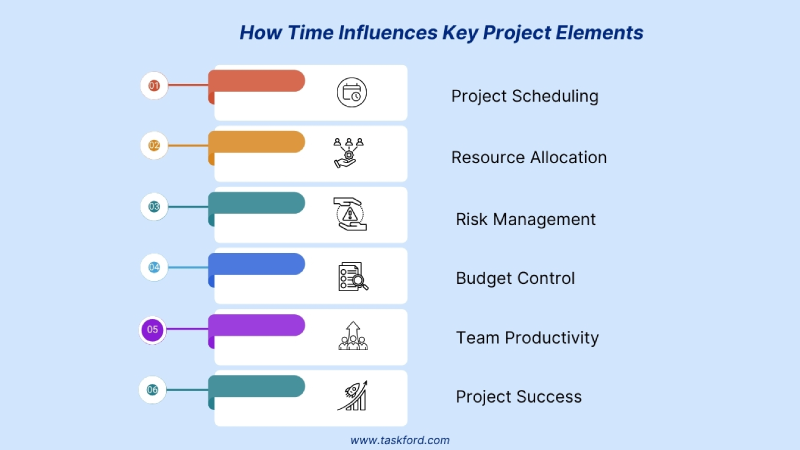
In short, time influences every aspect of your project, from scheduling and resource allocation to risk management and team coordination. By managing time wisely, you keep your project on track and ensure successful delivery.
Practical Strategies to Leverage Time as a Resource
Time, a finite and non-renewable resource, requires strategic management for project success. By treating time as a critical asset, project managers can align tasks, control costs, and mitigate risks. Here are five strategies to leverage time and keep projects on track.
1. Use Project Management Tools
Leverage software like TaskFord or Asana to create clear timelines and track progress. These tools visualize task dependencies and deadlines, helping teams stay organized.
For example, a Gantt Chart in TaskFord can map out a construction project’s phases, ensuring the timely completion of foundational work before moving to finishing tasks.
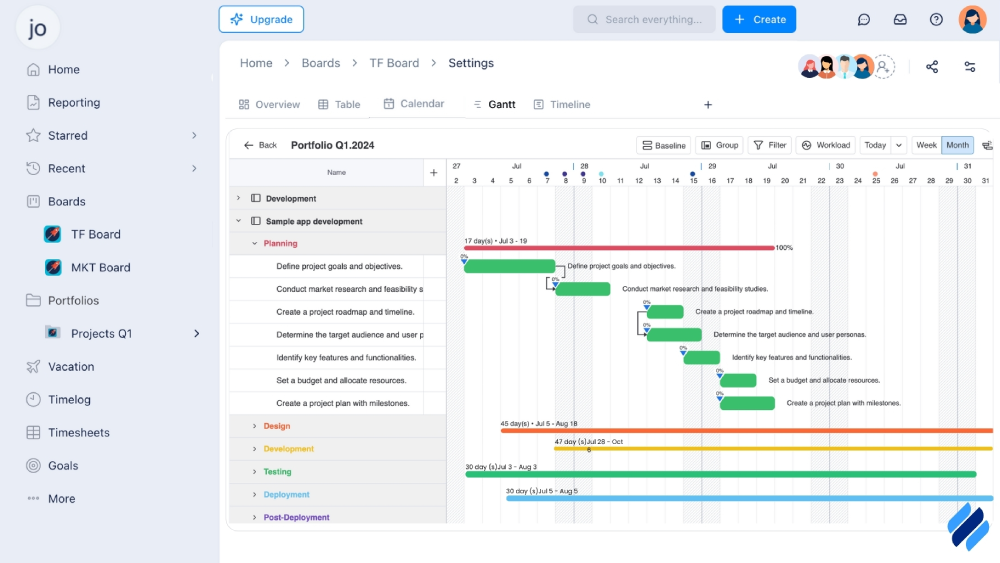
2. Prioritize Tasks with the Critical Path Method (CPM)
Identify time-sensitive tasks that directly impact project duration using the Gantt Chart Critical Path Method. By focusing on these tasks, teams avoid delays in the overall timeline.
For instance, in a software development project, coding and testing are critical path tasks that must be prioritized to meet launch deadlines.
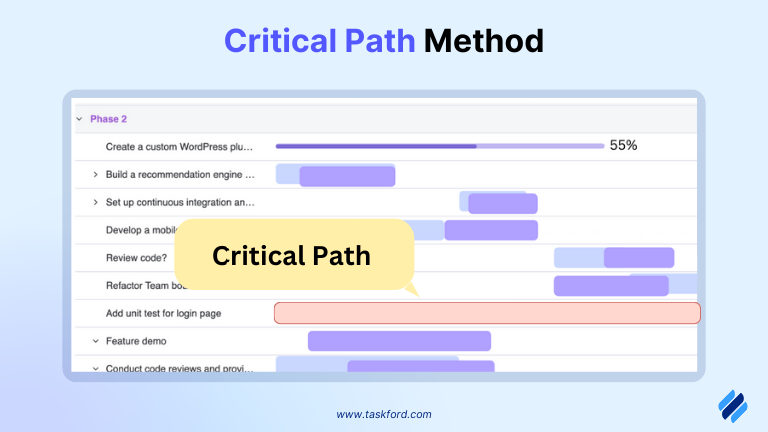
3. Set Realistic Deadlines
Base time estimates on historical data, expert input, or past project insights to avoid overly optimistic schedules.
For example, a marketing team planning a campaign might allocate two weeks for content creation based on previous projects, preventing rushed deliverables and ensuring quality.
4. Monitor and Adjust Progress Regularly
Conduct weekly check-ins or agile sprints to track progress and adjust timelines as needed. Tools like Kanban boards can highlight bottlenecks early.
For example, a product launch team might use daily stand-ups to ensure design revisions don’t derail the schedule, keeping time allocation on track.
5. Build Contingency Time
Allocate 10-15% of the project timeline as a buffer for unexpected delays, such as supply chain issues or technical glitches. In a manufacturing project, adding a two-week buffer can absorb equipment downtime without missing delivery dates, safeguarding quality and deadlines.
Key Takeaway: By implementing these strategies, project managers can harness time as a resource to drive efficiency, reduce costs, and ensure successful outcomes. Proactive time management transforms this finite asset into a project’s competitive edge.
Why Time Cannot Be Ignored
Time is the one project resource you can’t afford to overlook. Unlike budget or personnel, which can sometimes be adjusted, time is finite and unforgiving—once it’s gone, it’s gone. Ignoring time as a project resource risks catastrophic consequences, from missed deadlines to eroded stakeholder trust. Here’s why effective time management is non-negotiable in project success.
1. Delays Undermine Stakeholder Trust
Missed deadlines signal unreliability, damaging relationships with clients, investors, or teams. For example, a delayed product launch can erode customer confidence and market share, as seen in a 2023 case where a tech startup lost 20% of its pre-order base due to a three-month delay caused by poor time planning.
2. Cost Overruns Escalate Rapidly
Time directly impacts costs. Delays increase expenses like labor, equipment rentals, or penalties for late delivery. A 2023 PMI report found that projects missing deadlines face 12% higher costs on average. For instance, a construction project delayed by a month might incur thousands in additional wages, making time management critical to staying on budget.
3. Team Morale and Productivity Suffer
Unrealistic or poorly managed timelines create stress, burnout, or disengagement. A software development team facing constant deadline pressure may rush coding, leading to errors or turnover. Clear time allocation, conversely, fosters focus and morale, ensuring sustainable productivity.
4. Quality and Reputation Take a Hit
Rushing to meet deadlines due to prior time mismanagement often compromises quality. A manufacturing project that skips quality checks to recover lost time risks defective products, harming brand reputation. Building time buffers and realistic schedules prevents such trade-offs.
Key Takeaway: Ignoring time as a project resource invites delays, cost overruns, team burnout, and quality issues. By prioritizing time management, project managers can safeguard success, making time an asset that’s impossible to overlook.
Conclusion
Time is one of the most valuable, yet often overlooked, resources in project management. Its finite nature means that every minute counts, influencing everything from scheduling and resource allocation to risk management and project success. By recognizing time as a critical asset and managing it effectively, project managers can keep projects on track, control costs, and meet deadlines.
Ignoring time as a resource can result in costly delays, strained relationships, and poor project outcomes. However, with strategic time management, projects can move forward efficiently, delivering value and achieving success. By embracing how time acts as a project resource, project managers can navigate challenges more effectively and ensure smoother project execution.
Related Reading
- 5 Project Time Tracking Myths That Are Holding Your Projects Back
- Contingency Planning in Project Management: How to Stay on Track When Things Don’t Go as Planned.
- Agile Capacity Planning: How to Match Team Velocity with Real-World Workloads
- How To Use a Gantt Chart for Marketing Projects and Campaigns.
Making work simpler,
smarter, and more connected
Join our waitlist and be notified first.

Subscribe for Expert Tips
Unlock expert insights and stay ahead with TaskFord. Sign up now to receive valuable tips, strategies, and updates directly in your inbox.





